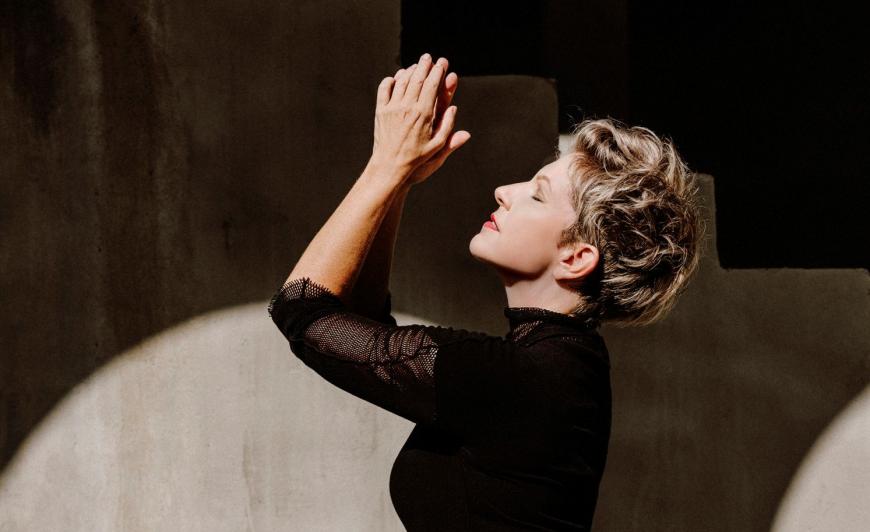
Kansas-born mezzo-soprano Joyce DiDonato had already participated in Houston Grand Opera’s young artist program and San Francisco’s own Merola Opera Program when the August 2001 broadcast of her performance as Meg in Houston’s world premiere of Mark Adamo’s Little Women thrust her into the public spotlight. But it wasn’t until she began performing mezzo coloratura parts in works by Rossini and Handel that the world became aware that, as fine as she may be in lyric roles, her most enduring gifts lie in the range-stretching pyrotechnics of bel canto.
It didn’t take long for the midwestern mezzo to show the world that she wasn’t just another conservatory product with technique and high notes. Listen, for example, to her unique embellishments, unbridled sense of humor, and flawless execution in this fabulous concert performance of “Una voce poco fa” from Rossini’s The Barber of Seville.
The performance of this aria and opera that undoubtedly sticks most in people’s minds is the one a wheelchair-bound DiDonato gave shortly after she broke her fibula during a performance at the Royal Opera House, Covent Garden. You can buy the entire video of that 2009 performance here.
Starting with DiDonato’s early recordings, I wouldn’t want to be without her 2004 release for Virgin Classics, Amor e gelosia — Handel: Operatic Duets, in which she and Patrizia Ciofi are supported by Il Complesso Barocco under Alan Curtis.
By 2008’s Furore: Handel Opera Arias, DiDonato has hit her stride. Her ability to use consonants to infuse long Baroque arias with emotion (which you can see her discuss with Avery Amereau in a brilliant Juilliard master class) and her superb acting chops have made her a diva for the ages.
After that, you can just about take your pick. I vividly recall how mind-blowing it was to hear her first album of Rossini arias, Colbran, The Muse. She begins with “D’amor al dolce impero,” from Armida, whose live performance by soprano Maria Callas at the Florence May Festival in 1952 remains lodged in the memory of any self-respecting opera lover who hears it. As aware of what Callas did with that number as she is of what every coloratura soprano in recorded history has done with “Bel raggio lusinghier,” from Semiramide, DiDonato proceeds to make these and other career-defining arias her own.
All-star performances of Vivaldi’s sacred music and Stabat Mater; Handel’s Radamisto, Floridante, Alcina, and Ariodante; Mozart’s Don Giovanni and La clemenza di Tito; and Hector Berlioz’s Benvenuto Cellini and Les Troyens are self-recommending. I wasn’t a huge fan of Jake Heggie and Terrence McNally’s Great Scott at its Dallas premiere, but their first breakthrough effort, Dead Man Walking, made a tremendous impact during its Dallas Opera revival. The Bay Area’s own Frederica von Stade reprises the role of the mother, which was composed for her, and Patrick Summers conducts on this recording.
With each passing year, DiDonato has cultivated the means to translate her emotional commitment into sound, as well as into facial expressions and actions. For the tragic DiDonato, don’t miss the video of her Metropolitan Opera performance of Gaetano Donizetti’s Maria Stuarda.
Having been around gay men since the start of her career (if not well before), DiDonato was in more than a bit of a campy mood when, in 2012, she recorded Drama Queens. The eternal musical value of some of these arias may be open to question — DiDonato is not shy about exposing their vapid excesses — but their cred as coloratura showpieces is beyond question. This must-hear recital is a hoot.
As her social media presence has increased her profile, DiDonato has been bolder in her advocacy of human rights and the planet. 2016’s In War and Peace and 2022’s Eden are musts.
So, too, is her Winterreise. DiDonato is hardly the first woman to perform and/or record cycles that Schubert composed for tenors or baritones: Elena Gerhardt, Lotte Lehmann, Brigitte Fassbaender, Christa Ludwig, and Nathalie Stutzmann are some of the great artists who preceded her. But she is the first to attempt to perform the cycle from the vantage point of the woman whose lover has gone off on what may very well be his final journey of suicidal despair. This 2021 release with Yannick Nézet-Séguin is essential. (And find selected video excerpts from her Carnegie Hall performance of the cycle here.)
Let’s end with her recent master class at the San Francisco Conservatory of Music, introduced by SFCM’s own Catherine Cook. Quote of the day: “Because if you’re going to sing this, you might as well sing it.”




